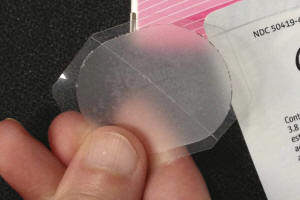Doctors want women to know the nuanced reality of hormone therapy for
menopause
[August 25, 2025]
By LAURA UNGAR
Menopause can usher in a host of disruptive symptoms like hot flashes,
night sweats and sleep problems. Hormone therapy promises relief.
But many women wonder about taking it. That’s because the treatment,
subject of a recent expert panel convened by the Food and Drug
Administration, has long been shrouded in uncertainty.
It was once used routinely. But in 2002, research testing one type was
stopped early because of concerns about increased risks of breast cancer
and blood clots. Concerns lingered even though later studies showed the
benefits of today’s hormone therapies outweigh the risks for many women.
“There is still a lot of confusion and a lot of fear,” said Grayson
Leverenz, a 50-year-old from Durham, North Carolina, who hesitated to
take it but is glad she did.
Others increasingly are also giving hormone therapy a second look. But
experts continue to disagree about how to present the treatment’s pros
and cons. The FDA-assembled panel stressed the benefits and suggested
health warnings be removed from at least some versions — prompting
dozens of experts to call for more input before making any changes.
Doctors say hormone therapy is a great option for many, but not all,
menopausal women — and it's important to understand the nuanced reality
of these treatments before deciding what’s best.
How hormone therapy works
It treats symptoms that can arise when menstruation winds down and ends,
causing levels of estrogen and progesterone to drop very low.

One type is low-dose vaginal estrogen therapy. Because it's applied into
the vagina, very little circulates in the blood and the risks are far
lower. Doctors say it’s a good option for women whose biggest complaint
is vaginal dryness.
Whole-body therapy includes pills, patches, sprays, gels or a vaginal
ring that deliver doses of hormones into the bloodstream at levels high
enough to have significant effects on symptoms like hot flashes. Such
systemic hormones include estrogens and progestogens.
Jennifer Zwink, a nurse in Castle Rock, Colorado, began using an
estrogen patch more than a year ago and also has an IUD, which gives her
progesterone. The treatment has relieved her hot flashes, improved her
sleep and eased her joint pain and bloating.
“It’s not like a 100% magic wand,” she said. “But it definitely has made
a significant difference.”
The Menopause Society says hormone therapy can lower the risk of
cardiovascular disease if started within 10 years of reaching menopause.
It may also reduce the risk of Type 2 diabetes and maintain bone density
for longer.
"They might have a drop in their bone density at age 60" instead of at
age 50, said Dr. MargEva Morris Cole, an OB-GYN with Duke University.
Hormone therapy carries some risks
When Leverenz was first prescribed hormone therapy last year, she kept
worrying about the risks she'd heard about — then finally decided: "I
can’t live like this anymore."
With a combination of three medications, her anxiety lifted, her sleep
improved, her joint pain and hot flashes went away.
“I just feel like myself again," she said.
Doctors say many patients hesitate to try hormones, and they try to
reassure them.
[to top of second column]
|

A low-dose estrogen skin patch is seen on Tuesday, Oct. 2, 2012. (AP
Photo/File)
 Women can use estrogen therapy for
seven years – and estrogen-progestogen therapy for three to five
years – before breast cancer risk goes up, according to the
Menopause Society.
The group says both estrogen therapy and estrogen-progestogen
therapy increase the risk of stroke, which goes away soon after
stopping hormones. The risk of blood clots rises if you take
hormones by mouth, but may be lower if you use a patch, gel or
spray.
“A lot of these risks are small,” said Dr. Nanette Santoro, an
OB-GYN at the University of Colorado. “And they have to be weighed
against the benefit of symptom relief.”
Age, medical history and how long women stay on the hormones are
also considerations. Many women take them for around five years, and
those who've had a stroke or certain other conditions may be advised
against using them at all.
Debate on changing warnings on hormone medications
Doctors are divided over whether there should be changes in “black
box” health warnings on some hormone treatments. All estrogen drugs
still carry boxed warnings about the higher rates of stroke, blood
clots and cognitive problems among women taking the medications.
Most of the physicians at the recent expert panel meeting convened
by the FDA prescribe the hormones or are involved with a
pharmaceutical industry campaign opposing the warning label. A
letter signed by 76 doctors and researchers argues that “removing
label warnings without adequate scientific assessment puts patients
at risk,” and asked the agency to hold an advisory committee meeting
with a public hearing before making any changes.
In the meantime, doctors urge people to be wary of misinformation,
like false claims on social media posts that hormones will prevent
dementia and ensure a healthy old age.
“We can’t say that you are going to live a longer, healthier life
because you took hormones,” Duke's Cole said. “I don’t want the
pendulum to go so far that people feel that it is promising health
for the next 30 to 40 years.”

Alternatives to hormone therapy for menopause
Santoro pointed to a new non-hormonal medication called fezolinetant,
marketed as Veozah, for hot flashes and night sweats. The
anti-epileptic medication gabapentin, in low doses, can also be used
for hot flashes and a moisturizer can improve vaginal dryness.
Experts also say regular exercise and a healthy diet can help manage
symptoms.
Santoro urged against the “wild proliferation” of supplements
claiming to be menopause cure-alls.
“Everybody is in on the menopause gold rush,” she said. “If it looks
too good to be true, it probably is.”
All contents © copyright 2025 Associated Press. All rights reserved |